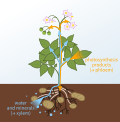Phloem: Difference between revisions
CSV import |
CSV import Tags: mobile edit mobile web edit |
||
| Line 21: | Line 21: | ||
{{stub}} | {{stub}} | ||
<gallery> | |||
File:Xylem_and_phloem_diagram.svg|Diagram of xylem and phloem | |||
File:Stem-histology-cross-section-tag.svg|Stem histology cross-section | |||
File:Phloem_and_Xylem_in_stem.svg|Phloem and xylem in stem | |||
File:Translocation_from_the_source_to_the_sink_within_the_phloem.svg|Translocation within the phloem | |||
File:Detaching_inner_bark_of_pine.jpg|Detaching inner bark of pine | |||
</gallery> | |||
Latest revision as of 04:58, 18 February 2025
Phloem is a type of tissue in vascular plants that transports water, sugars, and other nutrients from the leaves to the rest of the plant. It is one of the two types of transport tissue in plants, the other being xylem.
Structure[edit]
Phloem is composed of several different types of cells: sieve tube elements, companion cells, phloem parenchyma, and phloem fibres. Sieve tube elements are the main cells of the phloem and are responsible for transporting sugars and other nutrients. Companion cells help to maintain the sieve tube elements. Phloem parenchyma cells are involved in the storage and transport of nutrients, while phloem fibres provide support to the phloem tissue.
Function[edit]
The primary function of the phloem is to transport sucrose and other sugars from the leaves, where they are produced during photosynthesis, to the other parts of the plant. This process is known as translocation. In addition to sugars, the phloem also transports amino acids, hormones, and other substances necessary for plant growth and development.
Role in Plant Health[edit]
Phloem is crucial for plant health as it provides the necessary nutrients for growth and development. Damage to the phloem can lead to reduced growth, wilting, and even death of the plant. Some plant diseases, such as Dutch elm disease, are caused by pathogens that block the phloem, preventing the transport of nutrients.







